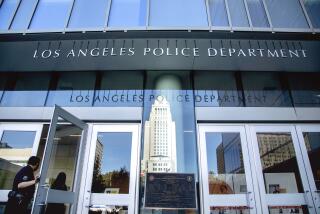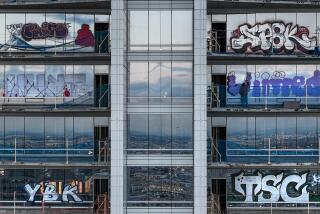Handling the next occupation in L.A.
The Los Angeles Police Department and city leadership have received well-deserved praise for their successful eviction of the Occupy L.A. protesters from the grounds outside City Hall last week. Smooth communication, a smart policing approach and a disciplined, restrained force combined to defuse a situation that had confounded police from New York to UC Davis.
Now that the occupation is gone, this is a moment to reflect on a lesson from the encounter that should guide city leaders going forward. It comes from the same philosophy that undergirds much of modern policing: the landmark work of James Q. Wilson and George L. Kelling, authors of the “broken windows” theory. Their article of that title, first published in 1982 by the Atlantic magazine, gave rise to community policing, which has come to mean everything from smart community relations to tough enforcement of low-level crimes. It is that latter meaning that was lost in the early moments of the Occupy L.A. protest and that is worth reconsidering now.
As Wilson and Kelling explained, small offenses give rise to larger ones. The neighborhood that is allowed to decay breeds crime; the police who allow minor miscreants to get away with littering or urinating on sidewalks or failing to appear for court dates eventually encounter those same men — they are almost always men — as burglars, robbers or murderers. One of the lessons of “broken windows,” then, is to confront small crimes assertively, and respectfully, to safeguard society from the consequences of decay and increased criminality.
In Los Angeles, city officials bent over backward to accommodate a group of protesters they in some ways admired — and who, in some ways, deserved that admiration. This page even applauded the city’s restraint. But what we didn’t anticipate is that once demonstrators were allowed to spend one night on the City Hall lawn, it became harder to deny them a second. And then harder still to deny them a third. Given the ambiguity of their demands, it became unclear what would ever cause them to leave, short of force.
All this seems academic now that it’s over, but the next group of squatters may be skinheads or anti-immigration zealots — protesters City Hall may enjoy less as neighbors. Going forward, a word of advice to the city leadership: No one should be allowed to sleep in the park. It closes at 10:30 every night for everyone. Enforcing that rule forcefully but thoughtfully — without regard to the message of those attempting to violate it — will save this city plenty of grief.
More to Read
A cure for the common opinion
Get thought-provoking perspectives with our weekly newsletter.
You may occasionally receive promotional content from the Los Angeles Times.






